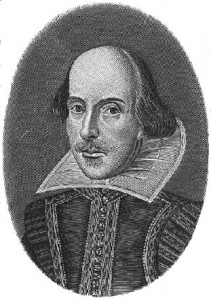I think Mark gets the cream bun this week, but well done also to Jonathan, Steve, Gadjo and anyone else who got some of the elements. If you’ve given up, click continue for the full answer.

Earlier Adelephant posed the ninth Round Blogworld quiz question, namely:
What connects Lowe’s paradoxical advice with: a ‘tuppence’ mystery and Bradbury’s carnies. A forerunner to Dracula. Where Sylvia’s sea god stays. Life six centuries after Ford. And something that Sting and Anthony Burgess have in common?
And the answer is… Shakespeare! All of the above refer to works which use a Shakespeare quotation in the title.
Nick Lowe’s paradoxical advice was that you’ve got to be Cruel to be Kind. That’s Hamlet to his mother (Act 3, Scene 4) – I must be cruel only to be kind/Thus bad begins and worse remains behind.
Cruel to be Kind was Lowe’s biggest hit, coincidentally reaching number 12 in all four of the UK, US, Australian and Canadian pop charts.
The ‘tuppence’ mystery refers to Agatha Christie’s Tommy and Tuppence stories, one of which is called By the Pricking of My Thumbs, from the 2nd Witch in Macbeth (Act 4 Scene 1): By the pricking of my thumbs/ Something wicked this way comes.
Ray Bradbury’s 1962 novel Something Wicked This Way Comes, about a hellish travelling carnival, completes the quotation.
The forerunner to Dracula is Bram Stoker’s first novel, The Primrose Path (1875). Another one from Hamlet this – Act, Scene 3, Ophelia to Laertes:
Do not, as some ungracious pastors do,
Show me the steep and thorny way to heaven,
Whiles, like a puff’d and reckless libertine,
Himself the primrose path of dalliance treads
And recks not his own rede.
Sylvia is Sylvia Plath, whose poem Full Fathom Five depicts her father as a sea god, dwelling in the deep. The title comes from Ariel’s song in The Tempest:
Full fathom five thy father lies
Of his bones are coral made;
Those are pearls that were his eyes:
Nothing of him that doth fade,
(incidentally, the next line introduces to the English language the phrase ‘sea-change’…But doth suffer a sea-change/ Into something rich and strange.)
The Tempest also provides the answer to the next clue, this time Miranda in Act V Scene 1: O brave new world! That has such people in it! Aldous Huxley’s novel Brave New World is set in the London of AD 2540, or 632 A.F. (‘After Ford’ – the book’s ‘Year 1’ being 1908 AD, when Henry Ford’s Model T car first rolled off the production line.)
Finally, what in tarnation do Sting and Anthony Burgess have in common? Nothing Like the Sun, from Sonnet 130 (My mistress’ eyes are nothing like the sun) is the title both of a 1987 album by Sting and of Burgess’ 1964 fictional biography of the Bard (the ‘Bard’ here being Shakespeare of course, not Sting).










